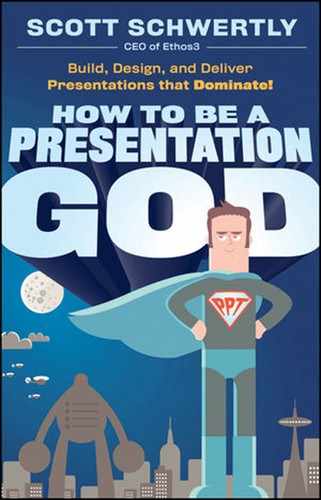2.1. THE CASE FOR EXCELLENCE
Steve Jobs, Dick Hardt, and Randy Pausch didn't give their first presentations on the worldwide stage. Neither did I, and neither did you. Our passion—that sense of burning within, the pursuit of excellence that drives us to put on a smile and give our best to a room of disaffected teenagers at "Bring a Parent to Work Day," for instance—is the requisite ingredient for the future stage. Every presentation matters because while we have seven seconds to create an impression in someone's mind, we spend our entire lives revising, amending, and building on that first impression. Just because you met your spouse rescuing him or her from a burning building doesn't mean you ride out the marriage in permanent adoration. In the same vein, a good or bad beginning doesn't determine the outcome of a presentation, either.
It's simply a chance to build on the momentum we create, which is why pursuing excellence early and often begets more excellence.
Though my parents never told me to strive for excellence, they taught me many other values. In fact, I can still hear my mother's voice saying, "Scott, liars never prosper," "Do unto others . . ." or, "Scott Brent Schwertly, don't run in the house!" However, there was never anything about excellence—because it was implied. The highest virtues, it seems, are often implicit in our interactions. We expect goodness but rarely request it in written contracts. We want respect but command it with actions rather than demand it in words. Yet by the time many of us reach adulthood, we have learned to apply our most virtuous efforts in compartmental fashion, rather than in every facet of our life. We play hard for a quarter, but not the whole game.
Excellence is a function of sustained effort and direction. In a sense, it comes naturally: As kids, most of us gave 110 percent to something. For some of us, it was calculus; for others, it was Pac-Man. Thus, in another sense, it doesn't come naturally at all. We either develop a habit of pursuing excellence across the board, or we learn to apply ourselves based on individual circumstances. We attain results wherever we devote our time and resources; this is the rule that governs effort. A sustained effort in the field of fantasy football will generate a meteoric rise to the top of one's league. Over several seasons, I've watched individuals build fantasy dynasties around their skilled but fantasy leadership. Results follow excellence, no matter where it is applied.
Aristotle said we live most happily when we live most excellently. Accomplishment is intrinsically rewarding; we become happy when we apply ourselves. There is wildness to happiness, a sort of unchained revelry in the natural will not just to survive, but to flourish. When we engage with our ambitions and act with determination, we enjoy far more than just a comfortable lifestyle and financial security. We experience primal fulfillment—the sense that, between living and dying, we have chosen to live, and live well.
The ability to master PowerPoint depends on your primal fulfillment. The tools of the trade—props, projectors, laptops, and so on—are inanimate extensions of you. You wield them. You decide their function and how they serve your purpose. There is a disconnection between the service and the use of these tools, though. Unless, like me, you present on the topic of presenting, the tools of presenting are not directly related to your expertise. Because of this tangential relationship with PowerPoint and other presentation programs, passionately excellent businesspeople devote minuscule resources to their presentations—not realizing that an audience unfamiliar with their long pedigrees of excellence may well judge them on slide aesthetics, stuttering, and whether a hairstyle looks "intelligent."
We live most happily when we live most excellently: The more excellence we chase, the more happiness we can expect. Like Pac-Man prodigies turned businesspeople, most presenters put 110 percent effort into occupational excellence and far less effort into managing the perception of that excellence.
Using presentations to advance your happiness starts by redefining excellence. The aforementioned businesspeople fail to expend maximum efforts in their presentations because they don't see how perception and reality are connected. Simply put, presentations aren't important to them. They emphasize capability without thinking critically about whether or not they are producing an impression of capability in their audiences' minds. Yes, you will always have to support what is stated in a presentation; however, the opportunity to do so comes after the deal is made, not before. The deal is made on promises, not on actions. If you don't apply excellence to your presentations, you have essentially built a boat from the top down, worrying about winds and currents before thinking about whether the vessel will even float.
I have a unique privilege as an author: the simple fact that you have picked up this book means you are in the upper quartile of business professionals today, and rarely does one have the opportunity to speak intimately to such an elite group. You are improving yourself in areas outside of your expertise and applying excellence across the board. Just as my mother never explicitly told me to be excellent—but rather, emphasized the individual components of what comprised excellent living—so, too, do we need to refocus our efforts on the elements. We think of excellence in terms of action; it's time to think of excellence in terms of perception, too.
